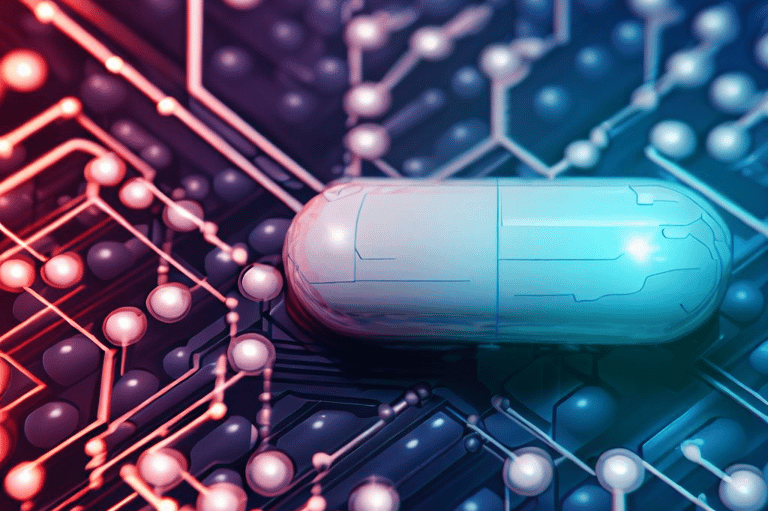Accelerating Drug Discovery: Leveraging Graph Neural Networks for Predicting Drug-Target Interactions
The drug discovery process is a complex and time-consuming journey that involves multiple stages, from initial discovery to final regulatory approval. However, with the advent of artificial intelligence (AI) algorithms, there is great potential to shorten this timeline and bring potential treatments to patients faster. This report aims to explore the current drug discovery process timeline and discuss how AI algorithms can accelerate this process.
9/19/20234 min read
The Drug Discovery Process Timeline
The drug discovery process typically consists of four main stages: discovery and development, preclinical research, clinical research, and regulatory approval. Each of these stages involves specific activities and assessments to ensure the safety and efficacy of potential drugs.
Discovery and Development: In this initial stage, researchers identify and validate potential drug targets. They then proceed to develop assays and conduct experiments to evaluate the effectiveness of various compounds.
Preclinical Research: Once promising candidates are identified, preclinical research begins. This stage involves extensive testing in laboratories and animal models to assess the drug's toxicity, pharmacokinetics, and effectiveness.
Clinical Research: If the results from preclinical research are positive, the drug moves on to clinical research. Clinical trials are conducted in human volunteers to evaluate the drug's safety, dosage, and potential side effects. This stage is subdivided into several phases, with each phase involving a larger number of participants and more rigorous assessments.
Regulatory Approval: After successful completion of clinical trials, the drug undergoes regulatory review by organizations such as the U.S. Food and Drug Administration (FDA). This final stage involves a thorough evaluation of the drug's safety, efficacy, and manufacturing processes. If approved, the drug can be marketed and made available to patients.
Current Timeline Challenges
The drug discovery process is known to be lengthy and time-consuming. On average, it takes around 10-15 years to develop a new drug. In order to analyze the impact of AI algorithms on accelerating drug discovery, it is crucial to understand the current drug discovery process and how AI can potentially enhance it.
The traditional drug discovery process involves several stages such as target identification, lead generation, lead optimization, preclinical testing, and clinical trials. These stages typically take a significant amount of time, often spanning several years. AI algorithms have the potential to expedite this process by utilizing advanced computational techniques and extensive data analysis.
One way AI algorithms can accelerate drug discovery is by facilitating target identification. With the vast amount of biological and chemical data available, AI algorithms can analyze this data to identify potential drug targets more efficiently and accurately. This can save time and resources by narrowing down the search for potential treatments.
Furthermore, AI algorithms can aid in lead generation by predicting and simulating the interactions between potential drug compounds and target molecules. Through machine learning techniques, AI algorithms can analyze large datasets and identify compounds that are more likely to have a therapeutic effect. This can significantly reduce the number of compounds to be tested in the laboratory, saving both time and resources.
Additionally, AI algorithms can optimize lead compounds by predicting their pharmacokinetic and toxicological properties. By analyzing large datasets of chemical structures and their corresponding properties, AI algorithms can identify compounds that are more likely to have favorable pharmacokinetic profiles and lower toxicity risks. This enables researchers to focus on developing compounds with higher chances of success, ultimately speeding up the lead optimization process.
Moreover, AI algorithms can assist in predicting the outcomes of preclinical testing. By analyzing historical data on the safety and efficacy of various compounds in preclinical models, AI algorithms can provide insights into the potential outcomes of new compounds. This can help researchers prioritize compounds for further development and reduce the number of unsuccessful compounds tested in preclinical studies.
Finally, AI algorithms can enhance the efficiency of clinical trials through patient selection and monitoring. By analyzing diverse patient data, including genetic and clinical information, AI algorithms can identify patient populations that are more likely to respond positively to specific treatments. This can help streamline the recruitment process and increase the chances of successful outcomes in clinical trials.
In conclusion, AI algorithms have the potential to greatly accelerate the drug discovery process. By leveraging advanced computational techniques and data analysis, AI algorithms can aid in target identification, lead generation, lead optimization, preclinical testing, and clinical trials. This can lead to a more efficient and timely discovery of potential treatments, ultimately benefitting patients by providing faster access to new therapies.
AI Algorithms in Drug Discovery
AI algorithms, such as machine learning and deep learning, have shown great promise in various stages of the drug discovery process.
Target Identification: AI algorithms can analyze vast amounts of biological and genetic data to identify potential targets, such as proteins or genes, that are involved in a particular disease. This speeds up the initial stages of drug discovery.
Virtual Screening: AI algorithms can analyze structural and chemical data to predict the activity and toxicity of compounds, helping researchers identify potential drug candidates more efficiently.
Drug Design: AI algorithms can be used to design and optimize the chemical structures of potential drug candidates. By analyzing structure-activity relationships and predicting compound properties, AI algorithms guide researchers in designing drugs with improved efficacy and reduced side effects.
Clinical Trials Optimization: AI algorithms can optimize the design and execution of clinical trials by analyzing historical trial data, identifying patterns, and predicting patient responses. This helps researchers design more efficient and effective trials.
Benefits of AI in Drug Discovery
The application of AI algorithms in drug discovery brings several benefits that can significantly accelerate the process.
Speed and Efficiency: AI algorithms can process and analyze vast amounts of data much faster than humans. This allows researchers to identify potential drug candidates and optimize their properties in a fraction of the time it would take using traditional methods.
Cost Reduction: The traditional drug discovery process is time-consuming and expensive. By leveraging AI algorithms, researchers can reduce the cost of drug discovery by eliminating certain experiments and reducing the number of failed trials.
Increased Success Rate: AI algorithms help researchers identify drug candidates with a higher probability of success. By analyzing large datasets, AI algorithms provide valuable insights that guide researchers towards potential treatments with improved efficacy.
Graph Neural Networks (GNNs) in Drug Discovery
Graph neural networks (GNNs) are a type of machine learning algorithm that can be applied to drug discovery. GNNs are designed to work with graph data, which represents relationships between entities, such as chemical compounds and proteins. GNNs have been rapidly applied to predict Drug-Target Interactions (DTIs) and have proved effective in finding repositioning drugs and accelerating drug discovery.
By leveraging AI algorithms, such as GNNs, the drug discovery process can be shortened, bringing potential treatments to patients faster. The use of GNNs allows for efficient analysis of the complex relationships between chemical compounds and proteins, aiding in target identification, lead generation, and optimization.
In conclusion, the integration of AI algorithms, including GNNs, in the drug discovery process holds tremendous potential for accelerating the development of new treatments. By leveraging advanced computational techniques, data analysis, and the ability to work with graph data, AI algorithms can revolutionize drug discovery and ultimately benefit patients by providing faster access to innovative therapies.


